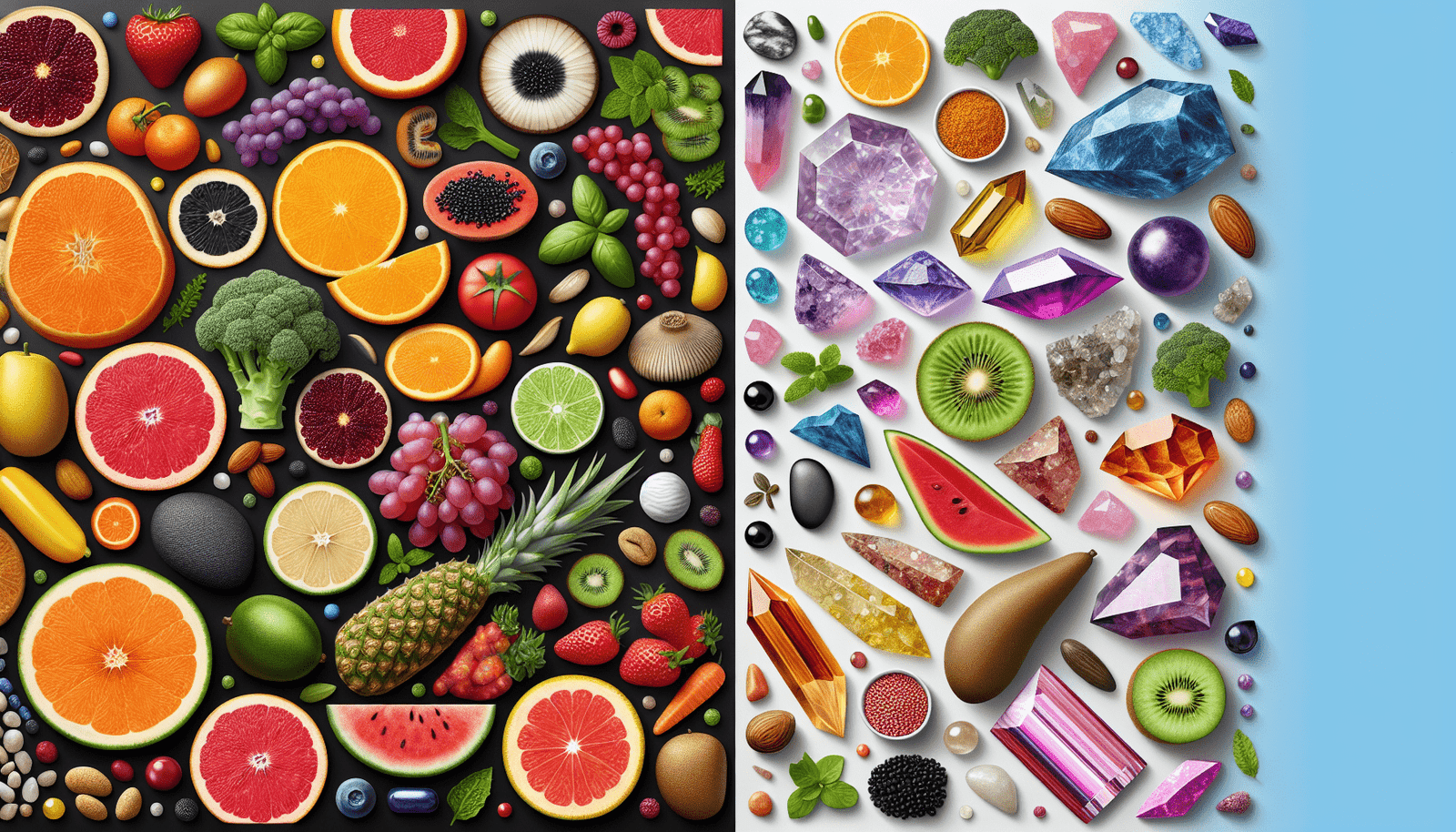In the realm of nutrition, it’s crucial to understand the distinction between vitamins and minerals. While they are both important for our overall health, vitamins and minerals play different roles in the body. Vitamins are organic compounds that our bodies need in small quantities to function properly. They help with various bodily functions, such as boosting our immune system and supporting cell growth. On the other hand, minerals are inorganic substances that are essential for maintaining proper bodily functions. They help in building strong bones, regulating fluid balance, and facilitating nerve impulses. By recognizing the unique roles of vitamins and minerals, we can make informed choices about our diet and ensure that we are meeting our nutritional needs.

Definition of Vitamins and Minerals
Vitamins and minerals are essential nutrients that our bodies need in order to function properly. They play important roles in maintaining our overall health and wellbeing. While both vitamins and minerals are required in small amounts, they have distinct differences in terms of their chemical composition and the roles they play within our bodies.
Vitamins
Vitamins are organic compounds that are needed in small quantities to support various bodily functions. They are essential for normal growth, development, and overall health. There are thirteen different vitamins that are classified into two categories: water-soluble vitamins and fat-soluble vitamins.
Minerals
On the other hand, minerals are inorganic substances that are required in small amounts to maintain our body’s structure, regulate various physiological processes, and support overall health. Minerals are classified into two categories: major minerals and trace minerals. Major minerals are needed in larger quantities, while trace minerals are required in smaller amounts.
Types of Vitamins
Water-soluble Vitamins
Water-soluble vitamins include vitamin C and the B vitamins (such as B1, B2, B3, B5, B6, B7, B9, and B12). These vitamins dissolve in water and are not stored in the body for long periods of time. Therefore, they need to be replenished regularly through our diet or supplements. Water-soluble vitamins play important roles in energy production, immune function, and the health of our skin, hair, and nails.
Fat-soluble Vitamins
In contrast, fat-soluble vitamins include vitamins A, D, E, and K. These vitamins are soluble in fats and are stored in the body’s fatty tissues and liver. Unlike water-soluble vitamins, fat-soluble vitamins can be stored for a longer period of time. They are involved in various functions such as vision, bone health, blood clotting, and antioxidant protection.
Major Minerals
Calcium
Calcium is a major mineral that is essential for strong bones and teeth. It is also important for muscle function, nerve transmission, and blood clotting. Good sources of calcium include dairy products, leafy greens, and fortified foods.
Phosphorus
Phosphorus is another major mineral that works closely with calcium to support bone health. It is also involved in energy production and DNA synthesis. Good sources of phosphorus include meat, dairy products, nuts, and legumes.
Potassium
Potassium is a major mineral that helps to maintain proper fluid balance, regulate blood pressure, and support muscle and nerve function. Good sources of potassium include bananas, potatoes, leafy greens, and beans.
Sodium
Sodium is a major mineral that is important for maintaining proper fluid balance, nerve function, and muscle contraction. However, excessive sodium intake can lead to high blood pressure. Good sources of sodium include salt, processed foods, and condiments.
Magnesium
Magnesium is a major mineral that is involved in over 300 biochemical reactions in the body. It plays a crucial role in energy production, muscle function, and maintaining a healthy immune system. Good sources of magnesium include dark leafy greens, nuts, seeds, and whole grains.
Chloride
Chloride is a major mineral that is closely associated with sodium and potassium in maintaining proper fluid balance and electrolyte levels in the body. It is also involved in the production of stomach acid, which aids in digestion. Good sources of chloride include salt, processed foods, and condiments.
Sulfur
Sulfur is a major mineral that is found in protein-rich foods. It plays a key role in various physiological processes, such as detoxification, collagen formation, and maintaining the structural integrity of skin, hair, and nails. Good sources of sulfur include meat, poultry, fish, and eggs.
Trace Minerals
Iron
Iron is a trace mineral that is crucial for the formation of red blood cells and the transportation of oxygen throughout the body. It is also involved in energy production and immune function. Good sources of iron include red meat, poultry, fish, beans, and fortified grains.
Zinc
Zinc is a trace mineral that plays a vital role in immune function, wound healing, and DNA synthesis. It is also important for taste and smell perception. Good sources of zinc include meat, shellfish, legumes, and whole grains.
Copper
Copper is a trace mineral that is necessary for the formation of red blood cells, collagen production, and the functioning of our immune and nervous systems. Good sources of copper include organ meats, shellfish, nuts, and seeds.
Manganese
Manganese is a trace mineral that is involved in the metabolism of carbohydrates, cholesterol, and amino acids. It also acts as an antioxidant, helping to protect against cellular damage. Good sources of manganese include nuts, whole grains, legumes, and leafy greens.
Iodine
Iodine is a trace mineral that is essential for the production of thyroid hormones, which regulate metabolism, growth, and development. Good sources of iodine include iodized salt, seafood, and dairy products.
Selenium
Selenium is a trace mineral that acts as an antioxidant, helping to protect our cells from damage. It also plays a role in immune function and thyroid hormone metabolism. Good sources of selenium include seafood, nuts, seeds, and whole grains.
Fluoride
Fluoride is a trace mineral that is important for the development and maintenance of healthy teeth and bones. It helps to prevent tooth decay and strengthens tooth enamel. Good sources of fluoride include fluoridated water, tea, and seafood.
Chromium
Chromium is a trace mineral that plays a role in carbohydrate and lipid metabolism. It is also involved in insulin action, which helps to regulate blood sugar levels. Good sources of chromium include whole grains, meat, and certain fruits and vegetables.
Molybdenum
Molybdenum is a trace mineral that is involved in various enzymatic reactions in the body, including the metabolism of sulfur-containing amino acids. It also plays a role in detoxification processes. Good sources of molybdenum include legumes, nuts, and whole grains.

Sources of Vitamins
Fruits and Vegetables
Fruits and vegetables are excellent sources of vitamins, particularly vitamin C and various B vitamins. They are also rich in antioxidants, which help to protect our cells from damage. It’s important to consume a variety of fruits and vegetables of different colors to ensure a wide range of vitamin intake.
Dairy Products
Dairy products such as milk, cheese, and yogurt are good sources of several vitamins, including vitamin A, vitamin D, and vitamin B12. They also provide calcium, which is essential for strong bones and teeth.
Meat and Fish
Meat and fish are rich in various B vitamins, particularly vitamin B12, which is only found in animal products. They also provide important minerals like iron and zinc. Lean cuts of meat and fish are typically the healthiest options.
Grains and Legumes
Whole grains and legumes provide a good amount of B vitamins, including thiamin, riboflavin, niacin, and folate. They are also rich in fiber, which promotes healthy digestion. Including a variety of whole grains and legumes in your diet can ensure a sufficient intake of vitamins.
Sources of Minerals
Fresh Produce
Fresh produce, such as fruits and vegetables, can be a good source of minerals. Leafy greens are particularly rich in minerals like calcium, magnesium, and potassium. Including a variety of fresh produce in your diet can help meet your mineral needs.
Dairy Products
As mentioned earlier, dairy products are not only a source of vitamins but also provide important minerals like calcium. Milk, cheese, and yogurt are all good options for obtaining necessary minerals.
Meat
Meat, especially red meat, is a good source of minerals like iron and zinc. Including lean cuts of meat in your diet can contribute to meeting your mineral requirements.
Seafood
Seafood, such as fish and shellfish, is rich in minerals like iodine, selenium, and zinc. It’s important to choose a variety of seafood options to obtain a balanced intake of minerals.
Whole Grains
Whole grains, such as brown rice, quinoa, and oats, provide important minerals like magnesium and phosphorus. Including a variety of whole grains in your diet can help ensure an adequate intake of minerals.
Nuts and Seeds
Nuts and seeds are not only a great source of healthy fats and protein but also provide minerals like magnesium, zinc, and copper. Including a handful of nuts or seeds in your daily diet can contribute to meeting your mineral needs.

Functions of Vitamins
Promoting Growth and Development
Vitamins play a crucial role in promoting proper growth and development, especially during childhood and adolescence. They are involved in processes such as cell division, bone formation, and tissue repair. A deficiency in certain vitamins can hinder normal growth and development.
Enhancing Immune Function
Vitamins, particularly vitamin C and vitamin D, are important for supporting a healthy immune system. They help to boost the production of antibodies, which are proteins that help fight off infections and diseases. Consuming an adequate amount of vitamins can help strengthen your immune system.
Regulating Metabolism
Certain vitamins, such as B vitamins, are involved in metabolic processes that convert food into energy. They help to break down carbohydrates, fats, and proteins, allowing your body to efficiently use them for energy production. Adequate vitamin intake is important for maintaining a healthy metabolism.
Maintaining Healthy Eyesight
Vitamins like vitamin A are essential for maintaining good eyesight. They play a key role in the formation of visual pigments in the retina, which are necessary for proper vision. A deficiency in vitamin A can lead to various eye disorders and even blindness.
Functions of Minerals
Building Strong Bones and Teeth
Calcium, phosphorus, and magnesium are important minerals that contribute to the growth and maintenance of strong bones and teeth. They provide structural support and help maintain bone density. Insufficient mineral intake can increase the risk of osteoporosis and tooth decay.
Transporting Oxygen
Iron is a key mineral involved in the production of red blood cells, which are responsible for transporting oxygen throughout the body. Without adequate iron intake, oxygen transport can be compromised and lead to fatigue and weakness.
Maintaining Electrolyte Balance
Sodium, potassium, and chloride are essential minerals that help maintain proper electrolyte balance in our body. They play a crucial role in regulating fluid levels, nerve function, and muscle contraction. An imbalance in these minerals can result in dehydration, muscle cramps, and other electrolyte disturbances.
Supporting Nervous System Function
Several minerals, including calcium, magnesium, and potassium, are necessary for proper nervous system function. They help transmit nerve signals, regulate neurotransmitters, and support overall brain health. Inadequate mineral intake can affect cognition, mood, and overall nervous system function.

Recommended Daily Intake
Vitamins
The recommended daily intake of vitamins varies depending on the specific vitamin and age group. It’s important to consume a well-balanced diet that includes a variety of foods to ensure an adequate intake of vitamins. In some cases, supplements may be recommended if dietary intake is insufficient.
Minerals
Similar to vitamins, the recommended daily intake of minerals varies depending on the specific mineral and age group. Adequate intake can generally be achieved through a varied and balanced diet. In certain cases, supplementation may be necessary, especially for individuals with specific deficiencies or medical conditions.
Deficiency and Toxicity
Vitamin Deficiency and Toxicity
A deficiency in vitamins can lead to various health problems and symptoms. For example, a deficiency in vitamin C can cause scurvy, while a lack of vitamin D can result in weak bones or rickets. On the other hand, consuming excessive amounts of certain vitamins, such as vitamin A, can lead to toxicity and adverse effects on our health.
Mineral Deficiency and Toxicity
Similarly, a deficiency in minerals can have negative consequences for our health. For example, an iron deficiency can result in iron-deficiency anemia, while a lack of iodine can lead to thyroid disorders. On the other hand, consuming excessive amounts of certain minerals, such as sodium, can cause issues like high blood pressure and kidney problems.
It is important to maintain a balanced and varied diet to ensure an adequate intake of both vitamins and minerals. Consulting with a healthcare professional or registered dietitian can help provide personalized recommendations based on individual needs and health conditions. Remember, good nutrition is the foundation for optimal health and wellbeing.